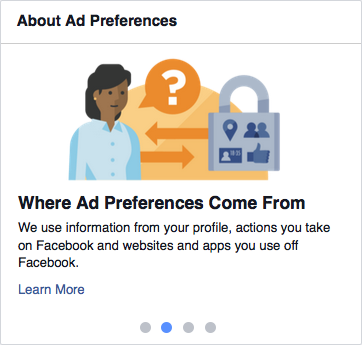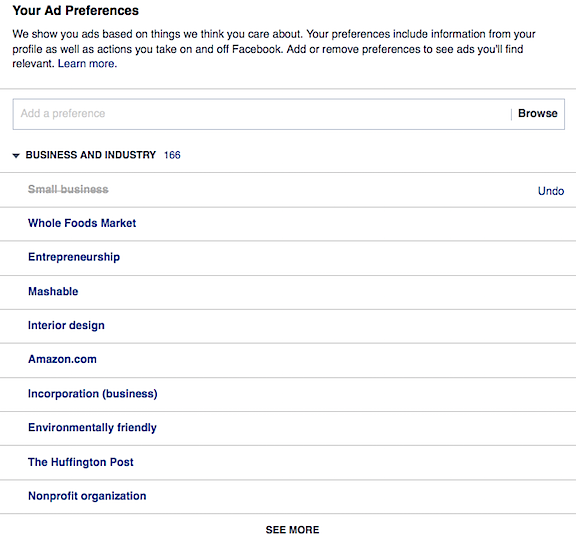Do they have no respect at all for a person’s privacy?
About every tenth time I connect to Facebook on my desktop computer, Facebook asks me for my cell phone number. They say it’s to protect my account — and there might be something to that, for all I know — but do they think my Facebook account is so valuable to me that I’m willing to hand off my phone number to an organization that apparently sells just about any information I give it?
Today took things to a new level. I was using the Facebook app in bed. This is part of my morning routine: I wake up so early that it’s simply too early to get out of bed. So I kill some time with Facebook and Twitter on my iPad. (I recently deleted both apps from my iPhone because of this.) Two creepy things happened:
- As I scrolled through my timeline, Facebook displayed an Amazon ad for everyday silverware that showed several plain styles. The top of the ad assured me that two of my friends liked Amazon. What was creepy was that I’d used the Amazon app on my phone the previous day while looking at silverware in Fred Meyer to determine whether the prices were reasonable. This could not be a coincidence. How did Facebook know? I thought I’d had my privacy settings buttoned down tightly enough, but apparently I didn’t.
- As part of a chat with a friend in the Twitter app, I used the Safari browser to visit Amazon’s UK website and find a link to a weather station I own. I pasted that link into a tweet. Moments later, when I went back to the Facebook app, Facebook asked me if I wanted to share the link to the weather station — it displayed not only the full link, but the Amazon preview that went with it — on my timeline. That meant the Facebook app was reading and interpreting what I’d copied in another app.
To say I felt dirty is an understatement. Facebook is poking around in my data in places it has no right to be.
On my iPad, I cleared out all Safari cookies and data. I checked settings to make sure I hadn’t missed any sharing settings — I hadn’t. I checked the Facebook app to make sure it wasn’t authorized to talk to the Amazon app — it wasn’t. And then I went to my computer and dug into my settings in Facebook to see what I’d missed.

Facebook admits it’s going to get creepy by monitoring “actions you take on Facebook and websites and apps you use off Facebook.” WTF?
Facebook’s settings is a rathole of options, the most important of which are buried so deep that they’re nearly impossible to find. Not only that, but it seems that they periodically change how you access certain settings to make them difficult to re-find in the future.
The one thing I did find was Ad Preferences. This screen lets you add or remove items you’re interested in. The creepy part? The list already includes hundreds of preferences based on things you’ve looked at, commented, liked, or otherwise shown an interest in.

Here’s a partial list of the interests Facebook has collected based on my actions. Some of them are completely off the wall: Harley Davison? Electric guitar? Gold’s Gym? Michigan State University?
I have to individually click each item to remove it from the list. This is a long and tedious process, made even more time-consuming by the need to click See More after each dozen or so items. There were well over 700 items on my list. And clicking a tiny X that only appears when you point where it should be just removes the items from this screen — I’m sure Facebook is keeping its own private list somewhere I can’t modify it.
How can I not sound paranoid?
My Twitter/Facebook friend Pam Baker writes about Big Data. I aways thought to myself, what’s the big deal? How much info could they possibly have about me?
Now I’m beginning to get an idea.
This makes it all the more important for me to use privacy settings. Quite frankly, it’s none of Facebook’s fucking business what I like or do when I’m not using Facebook. And even then, it’s creepy that they’re keeping track of it all.
Will this be the straw that gets me off Facebook? I can only hope.
Discover more from An Eclectic Mind
Subscribe to get the latest posts sent to your email.
As we used to say: “paranoia is not an illness, it is heightened awareness”.
What you describe is creepy weird but does not surprise me. What Mr. Zuckerberg knows about you will also be shared with advertisers and the NSA, of course for meta-data mining, if you ever make ‘The Man’ suspicious. I don’t use Facebook for just this reason. I don’t use Twitter because some of my thoughts cannot be condensed to just a sentence or two.
The perfect advertisement is one so precisely designed to match the interests of the viewer that a purchase is nearly inevitable. If the hit-rate can be raised the data on your preferences will be valuable to someone. Agencies trade this information which is one reason why Mr and Mrs Z became so rich they can give 99% of their fortune away and still stay fabulously wealthy.
I have an Amazon account. My wife asked me to use it to buy her little leather cover for her iPhone. I am now bombarded by ads for exotic leather products. Not all their efforts are perfectly focused…..
I definitely understand the whole advertising thing. What bothers me, however, is how Facebook can follow me around the Internet through the use of OTHER APPS and use that information to target ads at me. Yes, I expect Facebook to gather data while I’m on Facebook. But no, Facebook does not have my permission to gather information about me when I leave the site.
I took the Facebook app off all my mobile devices. I also removed access to Facebook via iOS on my devices. Now the only way I access Facebook is via the Firefox browser on my Mac, which is protected by an ad blocker and a cookie destroyer. It will be interesting to see what information Facebook can gather from me now.
As for Amazon, the biggest pain in the butt (or bum for UK readers) is buying a gift for someone and then having them target items to your account because of that. I just bought a bunch of kids books and toys; now they keep pushing kid merchandise at me. Ugh.
By making life easier for users, Facebook makes it easy to collect information about users. For example, the “click on [Facebook icon]” on this comment form.
Whenever a website authenticates a user via a Facebook API, the list of that user’s friends becomes available to that website. It is my understanding that the user has no control over this behavior.
http://thinkdiff.net/facebook/how-to-retrieve-facebook-users-friendlist/
https://developers.facebook.com/docs/graph-api/reference/v2.5/friendlist
And it almost goes without saying, the login API provides Facebook one of the more useful ways to track your browsing behavior.
‘Permission’ is a fantasy. US intelligence bugged Angela Merkel’s mobile phone. (we know that because Obama apologised). If they can do that I assume they can decipher every key-stroke I make.
Only boredom will stop them…in my case.
National security is one thing. Corporate greed is another.
Sure, but if the two domains use essentially the same cloned algorithms of meta-data analysis, then links within social and consumer contacts and links within security risk analysis are likely to have substantial overlaps. The extent of the overlap will be diagnostic for both advertisers and security services.
If all you do online is chat and order clothes, the risk will not trigger security worries. If you buy body armour and chat with pals at the mosque that might ring alarm bells. I’m guessing that the latest duo had a low Facebook profile?
Actually, no. One of the San Bernadino “suspects,” announced her loyalty to ISIS on Facebook.
I think that first ‘announcement’ of her radical ideology was just a few hours before she died. Not much time for correlating the data, let alone reacting to it.
Not trying to endorse what you experienced, but just providing a different spin on things. There’s no such thing as a free lunch, so for Facebook to not charge YOU for the use of its site, it’s got to come up with revenue elsewhere…in come the ads. After ads started appearing in various online platforms, the system adapted to a two-tiered payment model: a tiny payment for ad “impressions”, and a much larger payment for ad “clicks”. Facebook knows you’d never use the site/app with 85% of the screen tied up with ads, and they want that larger payment for click-through, so the logical next step is targeted ads, which led to a further logical step of third-party ad awareness tools that manage to tie together your shopping identity with your Facebook identity. It is what it is…
Understood. But I don’t have to like it and I don’t have to give them free rein when there’s a way to limit the information they can gather. Their use of my data is beyond mere ad placement — it’s invasive and creepy. I’ve already begun limiting my use of Facebook since this episode — I removed it from all my mobile devices so I can only access via my web browser with its auto-destruct cookies. I suspect I don’t get the same Facebook experience that most people get and that’s fine with me.
The only way to really retain any semblance of privacy is to eschew the digital world entirely. No internet, no smartphone, no credit cards. Not really an attractive option for those of us who have grown used to the convenience those devices provide. and a near impossibility for the youngsters of today. These “digital natives” that we keep hearing about appear to have an entirely different attitude towards privacy, apparently. It’s no big deal to them that virtually all the details of their lives are all out there in the datasphere, in fine-grained hi-rez, tied inextricably to the forest of devices and services they’re addicted to.
It remains to be seen whether this disregard for the widespread availability of their personal information will remain “no big deal” as their generation matures. Will the fact that big corp/gov data knows everything about them become an issue at some point? By then will it be far too late to do anything about it? Every detail about them from their blog entries to their every purchasing decision to the intricacies of their sexual preferences (thanks Pornhub) will be part of the digital fossil record, available for cross indexing and microscopic examination. Once a bit of your data goes into the internet, it never really ever goes away, no matter how much you’d like it to.
Unfortunately for our generation, those of us who still think privacy MATTERS somehow, we’re in for a long uphill slog against a very determined opponent. Every novel-length EULA we skip over when installing a program, every new “smart phone upgrade”, every bit of digital bric-a-brac we stuff onto our desktops or phone OS is actively working against us. Even when we pay for a program, there’s always someone else paying MORE to make sure that all our new software is tattling on us to someone. By far the worst offender is that seemingly wonderful bit of tech that most people have sitting in their pocket right now, their smart phone. Where our privacy is concerned, it’s the ultimate sleeper agent. The more uses we find for it, the more we depend on it, the more it ultimately betrays us.
Realistically, it comes down to choice. Is the convenience worth the cost?
Nicely put Sean.